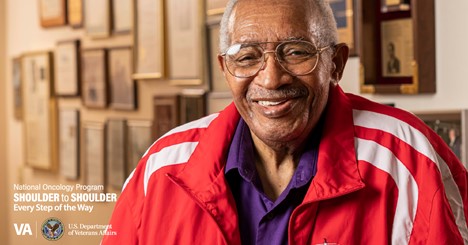What is health equity, and what does equitable cancer care mean for Veterans at VA?
Cancer impacts every race and ethnicity, but its affects can be amplified in certain groups due to long-standing social and economic prejudices and unfair biases, also known as structural inequalities.
Health equity means all people deserve to reach their full health potential. Health equity at VA, including equitable cancer care, means health care quality or treatment is not affected by a Veteran’s gender, race or ethnicity, location, or socioeconomic status.
Approximately 450,000 Veterans receive cancer care through VA every year, and there are more than 43,000 new diagnoses each year. These Veterans come from different ethnic backgrounds, regions of the country, genders and physical abilities. With this rich variety of experience, equity is a key element to providing Veterans the health care they deserve.
For VA’s National Oncology Program, guaranteeing health equity for Veterans means:
- Access for Veterans to top-rated physicians and cancer care specialists nationwide through clinical trials networks and National TeleOncology services.
- Systems of Excellence to address Veteran populations with specific needs.
- Nationwide infrastructure deployment that uses best-in-class diagnostics, molecular testing and clinical decision support tools.
Prioritizing equity means better outcomes
The positive impact of VA’s focus on health equity can be seen in the cancer care treatment outcomes of Veterans.
Prostate cancer is one of the most common diagnoses for the Veteran community. When Black Veterans turn to VA for their prostate cancer care, they do better. Studies have shown that Black men who use VA for prostate cancer screening and care have significantly better outcomes than those using private health care services. This is because VA reduces barriers to access traditionally seen in non-VA settings, which minimize racial disparities.
For bladder cancer, another common cancer diagnosis in Veterans, racial disparities fade in an equal access system. In fact, a recent study showed that mortality from bladder cancer for Black Veterans was lowered by 3 percent within VA as compared to other health care systems.
Real access means real equity
For rural Veterans, oncology care is especially difficult to access. According to an American Society of Clinical Oncology (ASCO) workforce report, 66 percent of rural counties have no oncologist. Veterans in these counties may face issues accessing care due to a lack of cancer providers in their local area.
Through VA’s rapidly expanding National TeleOncology service (NTO), cancer care providers can reach these Veterans regardless of where they are located.
Of the 4,131 patients seen across the country in 2021 through TeleOncology, almost 2,300 of them were in rural areas.
The minority communities within VA are deeply valued members of the Veteran population and VA’s cancer care is actively working to promote and ensure equity.
Dedicated resources for the Veteran community
The Center for Minority Veterans (CMV) works to ensure Veterans receive equal services regardless of race, origin, religion or gender. The Office of Health Equity (OHE) works alongside VA’s programmatic efforts to provide individualized health care to each Veteran in a way that eliminates disparate health outcomes and assures health equity. The National Oncology Program stands shoulder to shoulder with the CMV and OHE to guarantee an equitable experience for Veterans.
If you are a minority Veteran, learn more about the Office of Health Equity here, and the Center for Minority Veterans here.
If you have question about cancer care at VA, email cancer@va.gov.
Topics in this story
More Stories
Study underscores important role COVID vaccination can have in protecting Veterans from infection and reducing long-term health consequences
Columbia VA’s robotic surgery teams completed their 800th robotic surgery and are on schedule to hit 1,000 by the end of the year.
In a decentralized clinical trial, Veterans can participate from their own homes or local VA instead of having to travel to a research site.







I was not diagnosed and not a mis-diagnose as the doctors were not looking for anything cancer but renal problems. The insightful medical team in the ER at the VA in Jmauica Plain facility got it right from the hour I was there……all by accident as my driver had no idea how to navigate the streets of Boston nor where the medical facility I wanted to go to was located
The medical staff and definitely the oncology team rivaled any oncology ream at ant of the medical institutions in the area